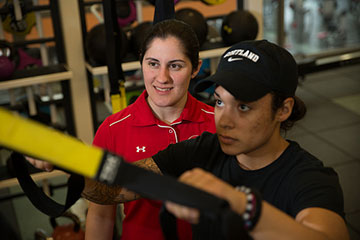Bulletin News

11/08/2016
SUNY Cortland’s Bachelor of Science in Community Health has received national accreditation through the Council on Education for Public Health (CEPH), confirming it is one of the best programs of its kind in the United States.
“We are one of only eight stand alone — not associated with a school of public health — bachelor’s programs in the country to have CEPH accreditation,” said Bonni C. Hodges, professor and chair of the College’s Health Department, which offers the degree program.
CEPH is the premier accreditation agency for both schools of public health and for all programs, graduate and undergraduate, which are a part of schools of public health. The rub is that degree offerings outside schools of public health haven’t been accredited by the organization. Until now.
CEPH realized that there were a growing number of bachelor’s programs in public health not connected to schools of public health, Hodges explained.
So they developed criteria and a process for accreditation of programs such as SUNY Cortland’s.
“This is both a new accreditation for us and a new accreditation,” Hodges explained.
The department had sought CEPH accreditation so that the Bachelor of Science in Community Health could undergo a quality assurance review, Hodges said.
“We thought we had a very good program but the opportunity for outside review against a strong set of professional criteria to confirm this and to help us make the program even stronger was a welcome opportunity,” Hodges said. “We were among the first stand-alone programs to apply, I believe.”
The CEPH Board of Directors voted in favor of five-year accreditation for the College’s program following an 18-month self-study and a subsequent, two-day campus visit by CEPH officials in April.
Accreditation will last until Dec. 31, 2021. SUNY Cortland is required to submit an interim report next fall.
The site visit team submitted many positive statements about the program in its final report submitted to the CEPH Board of Directors.
“Meetings with the institutional and academic leadership noted that the program was a university leader in service learning and internship experiences provided to students,” the visiting team reported.
Also noted in the report:
- The full-time, immersive process allows students to apply all of the public health principles they learned.
- Students express no concerns over finding or completing their placements.
- Fieldwork preceptors find that the students are of high quality, performing work commensurate with entry-level staff.
- Faculty are proactive in supporting the students and preceptors during the fieldwork semester.
- Fieldwork preceptors note students’ research abilities as a particular strength, including their understanding and use of reliable sources.
- Students are very positive about the broad advisement support offered by the faculty.
- Students, alumni and preceptors praise the commitment of faculty to helping students be successful and to resolving any problems.
The accreditation process also served to fulfill SUNY periodic program review requirements, Hodges noted.
“Accreditation does not change anything about day-to-day operations of the program, but the College’s self-study and the site visit team did suggest some ways in which to enhance and improve how faculty run the program,” Hodges said.
On the other hand, department members were pleased to get the word out about program strengths through the review process.
“The self-study confirmed our long-standing, positive working relationships with local, regional and state public health agencies and organizations,” Hodges said, noting some of the plusses.
“Student service-learning is embedded into the program early on and students must complete a full-time, semester-long internship as part of degree requirements,” she said. “Faculty work with public health and human service agencies and organizations on a regular basis.”

